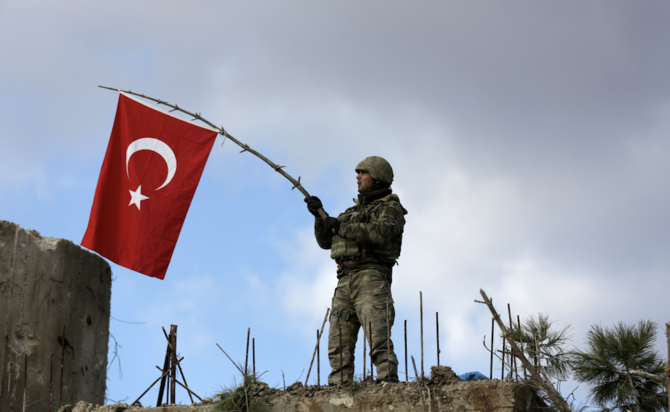Sinem Cengiz
There is a new phase in the Syria crisis, which has been a point of contention in Turkish-American relations since the civil war began in 2011. Although Ankara and Washington shared a common goal of ousting the Assad regime, they diverged in their visions and the policies they have implemented throughout the conflict. This has led them to cooperate with different groups in accordance with their own security interests.
The breaking point in relations happened when the US administration started to cooperate in the fight against Daesh with the People’s Protection Units, or YPG, which Turkiye views as the Syrian branch of the outlawed Kurdistan Workers’ Party, the PKK. It also insisted on continuing its partnership despite Turkiye’s grievances. However, last Sunday’s suicide bomb attack in Ankara, the first by the PKK inside Turkiye since 2016, appears to have influenced the balances in Syria, the US-YPG partnership, and Turkish-Syrian normalization talks.
Turkiye said the two attackers who carried out the bombing in front of government buildings in Ankara had come from Syria, and that all Kurdish militant facilities in Syria and Iraq were therefore now legitimate military targets. Significantly, Turkish Foreign Minister Hakan Fidan warned “third parties” to stay away from the targeted areas, which was a clear message to the US forces working with the YPG in Syria.
It was evident from Fidan’s statement that Turkiye intended to respond to this attack militarily. The ministermet Syrian opposition leaders on Tuesday, which indicated preparation for this. Turkiye has been a significant military and political ally of the Syrian opposition groups who control the last rebel-held bastion in the country, in northwest Syria near the Turkish border.
Ankara’s response to the bombing came initially with airstrikes on Kurdish targets in Iraq, followed by further strikes on Thursday on the Kurdish-held zone of northeast Syria, during which for the first time the US show down a Turkish drone.
All this came about shortly after Damascus repeated its demand for the withdrawal of Turkish troops from northern Syria as a condition for normalizing relations. Turkiye, despite its readiness to resume normalization talks with Syria, refuses to withdraw from areas under its control in northern Syria. Ankara is skeptical over the ability of the Syrian army to protect the borders, knowing that the YPG works with Assad’s forces in some areas, while claiming official status under the regime.
Russia, meanwhile, wants a return to the Adana Agreement, signed in 1998, which allows Turkish forces to penetrate 5 km into Syrian territory when faced with threats. But Turkiye now insists on a distance of 30 km. Iran is pushing for the withdrawal of Turkish forces. So far, however, Turkiye’s partners in the Astana process, namely Russia and Iran, which have both used the Kurdish card against Turkiye in the past, have failed to convince the Syrian regime or address Turkiye’s security concerns.
However, Turkiye’s primary interlocutor in Syria is not Russia, Iran or the Syrian regime, but Washington. The US has conflicting interests with Turkiye when it comes to Syria. Ankara views the YPG, which dominates the Washington-allied Syrian Democratic Forces, as a national security threat, while the US sees the SDF as a key partner in the fight against Daesh and does not categorize it as a terrorist group, although it does acknowledge the PKK as such. It is crystal clear that if US special forces pulled out of Syria the SDF would be unable to sustain itself. It is also evident that, since 2014, the YPG’s ambitions are beyond fighting Daesh or protecting the territory it controls. Rather, it aims to achieve security and political control over northern Syria and a key role in shaping the political future of the country.
However, the Biden administration has ruled out a withdrawal, saying the US-led coalition will continue to partner with the SDF. Despite eradicating Daesh’s stronghold more than four years ago, the US forces are still there, lacking a clear withdrawal plan or an endgame for their operation in the country. While there are voices in the US questioning the necessity of maintaining the partnership with the SDF at the expense of Turkiye, the latter being a traditional US and NATO ally and a key player in regional and global issues, including Ukraine, the US House of Representatives in March voted against a resolution directing the Biden administration to withdraw all US troops from Syria.
The conventional reading of US policies suggests that there has never been a predictable and consistent American policy in the region when it comes to addressing the concerns of its allies. America’s partnership with the SDF is not based on norms or principles, nor does it seek to bring peace to the region or Syria. There has always been an expectation in Ankara that the US would someday abandon the SDF in favor of the Syrian opposition. Turkiye has repeatedly proposed viable options for cooperation with the US in Syria.
However, Washington’s unwillingness to pursue a concrete plan that addresses Turkish concerns is the primary reason Ankara is approaching this matter from a hard power perspective.
Furthermore, US consistency in this policy is pushing Turkiye to collaborate with Russia and Iran and, more importantly, to approach Damascus for normalization. In this new phase in Syria, the US should find ways to converge its policies with Turkiye’s security interests, rather than alienating Turkiye while Iran and Russia increase their sphere of influence.







